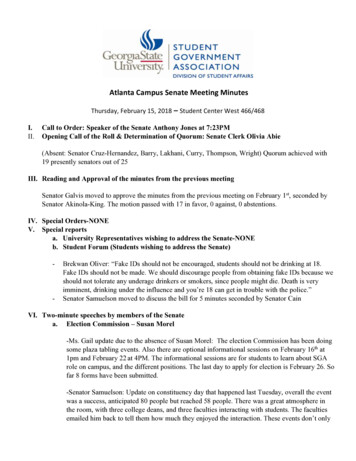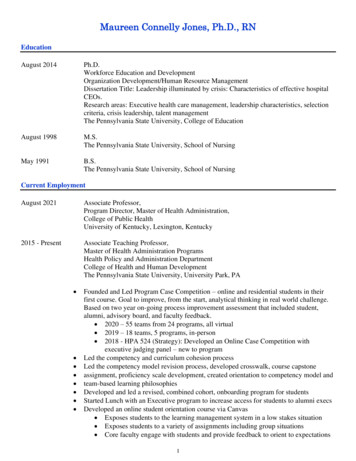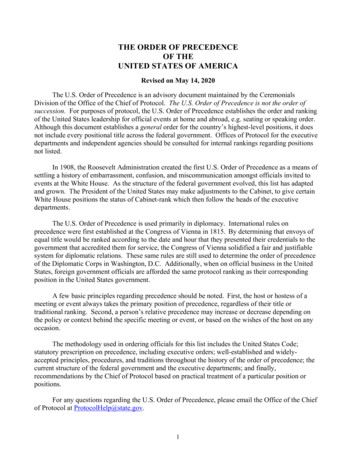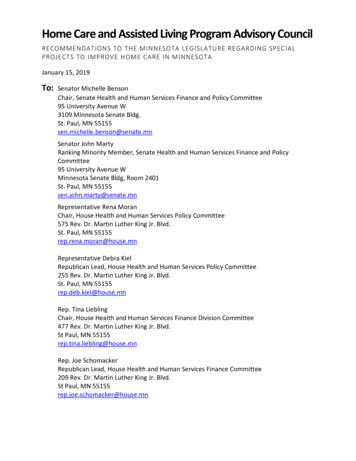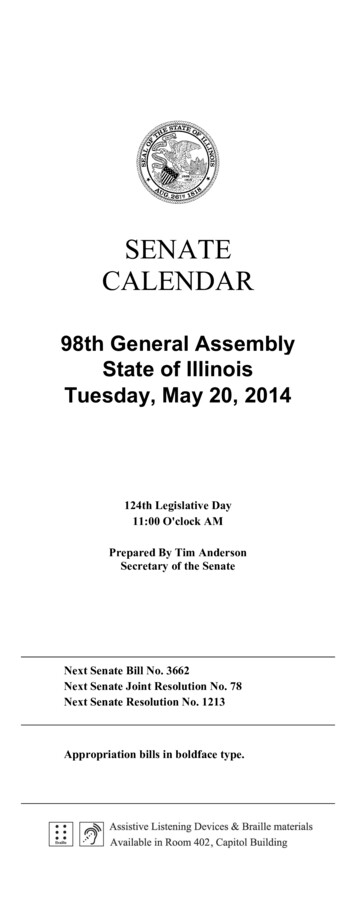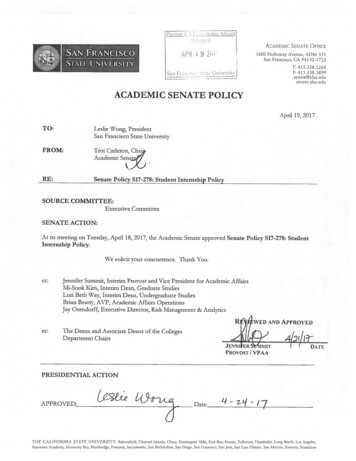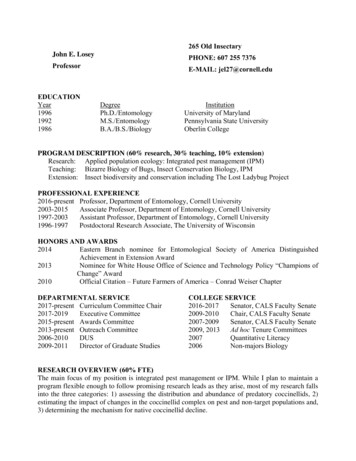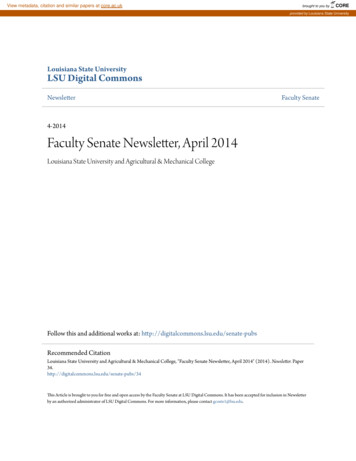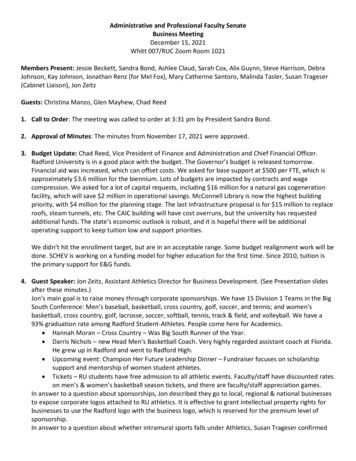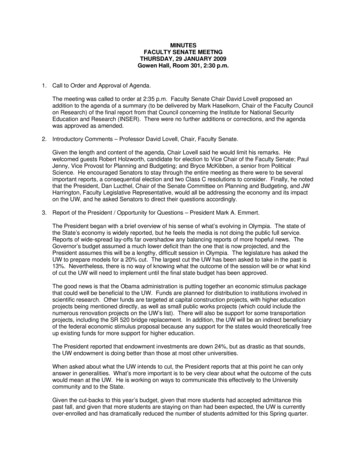
Transcription
MINUTESFACULTY SENATE MEETNGTHURSDAY, 29 JANUARY 2009Gowen Hall, Room 301, 2:30 p.m.1. Call to Order and Approval of Agenda.The meeting was called to order at 2:35 p.m. Faculty Senate Chair David Lovell proposed anaddition to the agenda of a summary (to be delivered by Mark Haselkorn, Chair of the Faculty Councilon Research) of the final report from that Council concerning the Institute for National SecurityEducation and Research (INSER). There were no further additions or corrections, and the agendawas approved as amended.2. Introductory Comments – Professor David Lovell, Chair, Faculty Senate.Given the length and content of the agenda, Chair Lovell said he would limit his remarks. Hewelcomed guests Robert Holzworth, candidate for election to Vice Chair of the Faculty Senate; PaulJenny, Vice Provost for Planning and Budgeting; and Bryce McKibben, a senior from PoliticalScience. He encouraged Senators to stay through the entire meeting as there were to be severalimportant reports, a consequential election and two Class C resolutions to consider. Finally, he notedthat the President, Dan Lucthel, Chair of the Senate Committee on Planning and Budgeting, and JWHarrington, Faculty Legislative Representative, would all be addressing the economy and its impacton the UW, and he asked Senators to direct their questions accordingly.3. Report of the President / Opportunity for Questions – President Mark A. Emmert.The President began with a brief overview of his sense of what’s evolving in Olympia. The state ofthe State’s economy is widely reported, but he feels the media is not doing the public full service.Reports of wide-spread lay-offs far overshadow any balancing reports of more hopeful news. TheGovernor’s budget assumed a much lower deficit than the one that is now projected, and thePresident assumes this will be a lengthy, difficult session in Olympia. The legislature has asked theUW to prepare models for a 20% cut. The largest cut the UW has been asked to take in the past is13%. Nevertheless, there is no way of knowing what the outcome of the session will be or what kindof cut the UW will need to implement until the final state budget has been approved.The good news is that the Obama administration is putting together an economic stimulus packagethat could well be beneficial to the UW. Funds are planned for distribution to institutions involved inscientific research. Other funds are targeted at capital construction projects, with higher educationprojects being mentioned directly, as well as small public works projects (which could include thenumerous renovation projects on the UW’s list). There will also be support for some transportationprojects, including the SR 520 bridge replacement. In addition, the UW will be an indirect beneficiaryof the federal economic stimulus proposal because any support for the states would theoretically freeup existing funds for more support for higher education.The President reported that endowment investments are down 24%, but as drastic as that sounds,the UW endowment is doing better than those at most other universities.When asked about what the UW intends to cut, the President reports that at this point he can onlyanswer in generalities. What’s more important is to be very clear about what the outcome of the cutswould mean at the UW. He is working on ways to communicate this effectively to the Universitycommunity and to the State.Given the cut-backs to this year’s budget, given that more students had accepted admittance thispast fall, and given that more students are staying on than had been expected, the UW is currentlyover-enrolled and has dramatically reduced the number of students admitted for this Spring quarter.
January 29, 2009 Faculty Senate Minutes2Gordon Watts, Physics, asked whether the President sees these economic times as a severe dipfrom which the UW will slowly, but completely recover – or as a “re-set” to a different, on-goingeconomic climate. The President responded that although it is still too early to tell, he assumes thatthe truth is probably somewhere in between the two. There may possibly be a surge of growth,followed by slow, organic growth in the economy.4. Report from the Senate Committee on Planning and Budgeting – Professor Dan Luchtel,Committee Chair.Senate Committee on Planning and Budgeting (SCPB) Chair Dan Luchtel reported that he seems tobe between a rock and a hard place. On the one hand, he feels bad that he doesn’t have muchdefinitive to say since there is still so much budgetary uncertainty. On the other hand, he would likelyfeel even worse if he had something definitive to say since it would be about bad news, very badnews.For the ’09-’11 biennium, the Governor’s proposed budget cuts the university’s budget by 13% fromits current base. For the biennium, a 13% reduction would result in a loss of 116 million. For the nextfiscal year (’09-’10), 13% would be a reduction of 58 million on a base of 425 million in stateoperating funds. A ray of hope is that possible revenue enhancements would ameliorate themagnitude of such a cut. Foremost is the possibility of a tuition increase. Second, the Democrats inthe State Legislature are talking about the possibility of passing “revenue enhancements.” Third, thefederal government is developing an Economic Stimulus Package, entitled the American Recoveryand Reinvestment Act, that would, among other things, include funds for university capital projectsand increased funding for the National Science Foundation and the National Institutes of Health.The President and Provost sent out a letter dated January 22, 2009, providing guidelines andprinciples for how to implement the ’09-’11 budget cuts. This is now moving forward at the individualunit levels and Luchtel encouraged all Senators to communicate with members of their College orSchool Councils as they work with and advise their respective Deans and Chancellors in thedevelopment of the unit budgets.This letter and many informative documents are on the website of the Office of the Vice Provost forPlanning & Budgets. He strongly recommend that all Senators go to this site often for the latestupdates on UW budgets. The URL is: http://www.washington.edu/admin/pb/home. In particular, hesuggested that inquirers go to the ‘Spotlight” section along the right-hand side of this webpage.The Senate Committee on Planning and Budgeting has developed a document to articulateoverarching principles to guide the individual approaches of the units in making budget cuts. Theseare: Maintain instructional viability and quality (the foremost goal); Maintain institutional access for incoming students; For enrolled students, maintain access to coursework that allows them to progress toward theirdegrees; Protect instructional and research quality; Avoid staff and faculty layoffs as far as possible.Luchtel reported that at the last Board of Regent meeting, President Emmert, despite the severity ofthe current budget crisis, reviewed five areas he feels the University should press forward on. Theseare: 1) Environment issues (particularly issues in climate change and sustainability) that will becoordinated in a new College of the Environment; 2) energy issues—that is, its production,consumption, political and economic implications, and global economic implications; 3) massurbanization of human populations; 4) the continuing issues and needs for healthcare; and 5) the nextwave of information technology.In response to a question about the five areas that President Emmert feels should be the focus ofsupport going forward, even in difficult financial times, he stepped in to say that these are areas thathe has been talking about for some time. In the Regents meeting he was using them to make a pointthat there are several challenges facing the UW – the largest being that while the University is in the
January 29, 2009 Faculty Senate Minutes3midst of extreme financial difficulties, it needs to keep a focus on what the goals are for the next five,ten and fifteen years. With that in mind, he notes that there’s a significant number of student whowould like to attend the UW. At the same time, the Obama administration talks of a renewedinvestment in science. Emmert would like to take advantage of both of these “waves.” He hopes toride those waves in such a way that will help the UW maintain its position as a premier research andteaching institution.In response to concerns about faculty recruitment, the President responded that positions are beingfilled with great care. In many ways it’s a great time to be recruiting faculty because there are manyhighly talented young would-be professors looking for positions.One faculty member expressed concern that the five areas the President defined in his presentationsounded like “plans.” He asked if the Senate Committee on Planning and Budgeting had beeninvolved in those plans. The President responded that those five areas are ones he introduced inOctober at his Annual Address. They are nothing more than the musings of a University President;they are not yet plans. The only one of those areas that has actually taken shape is the College ofthe Environment, and that plan has had much discussion and faculty involvement throughout theprocess. When the time comes that those musings take the leap to something greater, they will beon the SCPB agenda.5. Legislative Report – Professor James “JW” Harrington, Faculty Legislative Representative.Deputy Legislative Representative JW Harrington reported that while waiting for revenue, case-load,and enrollment forecasts in March, state legislators write bills – many bills – most mandatingsomething in particular. Bills will be considered by committees until late February, and then mustmove to the floor and to the other chamber, or else they go into suspended animation. By then, theyare not likely to be resurrected.Harrington and Deputy Faculty Legislative Representative Jim Fridley are working with RandyHodgins, as well as with the faculty representatives from the other state universities, to fight bad bills,increase awareness of the impact of cuts and changes on education, and reduce the perception thatthe University of Washington is so rich that it can handle any cut with ease. They meet (and are infrequent e-mail communication) with legislators and committee staff, caucus staff, and governor’sstaff; and they frequently sign in to support or suggest modification to bills. What they are arguing forare (1) flexibility and (2) the discipline not to add institutions or programs without funding.He encouraged Senators to contact him with any insights, suggestions, about the budget or thelegislative session:E-mail address: jwharringtonjr@gmail.comBlog: http://legrep.blogspot.com/Randy Hodgins (UW Director of State Relations) blog nally, Harrington offered a new perspective on the budget situation through what he described asdoggerel. Each line references something going on in Olympia:“Supplemental” bills that cut, not add;1a heavy-handed budget freeze.2Some bills proposed are really bad.We try to cut them at the knees.Universities must plan in great detailfor budgets yet unwritten.3As funds decline, state governmentwith gimmickry is smitten.4Degrees in three years,5 all science and math,6
January 29, 2009 Faculty Senate Minutes4We guarantee tuition.7BA degrees at very low costAt two-year institutions.8We cannot tax, we must not spend;all salaries are frozen.For social programs it is the end,except the few, the chosen.But lo – what hovers just beyond?A pledge to fund our young ones.9Our paramount duty,10 K through 12,may soak up all our new funds.Amidst all this, we look for hopeby improving oversight.Could a faculty regent11 help us copeWith our overwhelming plight?Notes:1HB 1694 is not a true “supplemental budget” because it includes only expenditure cuts withoutrecognition of likely case-load and enrollment increases. The Legislature will await those numbers inMarch before developing a true supplemental budget for the rest of this fiscal year. It’s also“supplemental” only in the sense of negative supplements to the current 2007-09 budget. The end-offiscal-year cuts to UW’s state support are essentially the same as in the Governor’s plan; the cuts tosome social welfare programs are slightly less than the Governor’s directives.2SB 5460 acts to freeze all state expenditures, including those from non-state sources; RandyHodgins and others were able to convince State Senator Ed Murray to offer a floor amendment toexempt the University’s activities that are contractual obligations to people and governments payingus totally separately from the state budget.3Each institution must present a scenario for enacting the 2009-11 cuts proposed by the Governor –what will this mean for enrollments, programs, degrees – and for cuts that are 50% greater.4The state will end up moving expenditures from operating to capital budgets, expanding thedefinition of the General Fund to increase our debt capacity, revising actuarial assumptions to reduceliabilities .5SB 5237, which was pulled from a scheduled hearing, called for each university to develop a fewthree-year degree programs for highly qualified entering freshmen.6Countless hearings, budget language, and bills call for more students to earn degrees in “highdemand fields,” which has been clarified to mean “high employer-demand fields,” defined asoccupations that require/imply specific post-secondary certificates or degrees which Washingtoninstitutions confer in smaller numbers than the annual employment vacancies in the state. Thisusually translates into computer science/engineering, allied health professions, science and matheducation, and a few others. The fact that most high-school graduates are neither prepared for norinterested in these fields is generally not considered.7Refers to the Guaranteed Educational Tuition program, through which anyone can buy an assetguaranteed always to equal 1% of the cost of resident undergraduate tuition, with that guaranteeassuming that the long-run average increase in tuition is no greater than the long-run rate of return onthe state’s investment pool. Also refers to SB 5174, which would guarantee that an enteringfreshman would have the same annual tuition for four years – but if (s)he needed more time tograduate, (s)he would be charged the value of tuition increases over those years, plus interest. Thehearing for this bill was cancelled.
January 29, 2009 Faculty Senate Minutes58HB 1726 and SB 5575 create “Bellevue College” as an independent state college offeringbaccalaureate degrees to the extent recommended by the Higher Education Coordinating Board;have not yet had hearings scheduled.9The Legislature established a Basic Education Task Force that spent the past year investigating theneeds of K-12 education in the state. Its report has suggested a wide range of reforms, which willrequire much more financial support from the state over the coming years.10Article 9 of the Washington State Constitution states that providing ample education for citizens isthe paramount duty of state government and its taxing authority. “Ample” has been treated flexibly –education to what level, to what standards, and augmented by local tax collections to what extent?11Representative Scott White is the prime sponsor of a bill (to receive a number tomorrow) tomandate that the Governor name a current or emeritus faculty member to each board of regents ortrustees. Most of the members of the House Higher Education Committee, and several others, havesigned as sponsors. The rationale is that oversight of the large-scale changes that will come –because of cuts and opportunities – will benefit from a board member with expertise in designingcourses and curricula, engaging in academic scholarship, and helping students learn.*********In response to a question about how small the UW percentage of state funds needs to get beforesome other relationship between the state and the university is considered, Harrington reported thatthe transfer of total control of tuition-setting to Regents is currently under consideration. Seriousdiscussions are also being held about the “high tuition/high aid” model. He is not aware of any otherrelated discussions in Olympia at this time. President Emmert suggested there are models ofoperations in other states that could be considered – including one in Oregon.In response to a question concerning a bill that would institute a complete budget freeze, includingfederal funding, the President interjected that this ill-informed bill will very likely die a quick death, andthat its motivation was to attract legislators’ attention to the gravity of the current economic situation.Harrington added that the two senators who sponsored the bill are actually very bright and are knownas friends of the UW. Randy Hodgins, Director of State Relations, recently noted in his Blog thatState Senator Ed Murray had offered an amendment to this proposed bill which would exemptactivities at universities from the freeze when they are paid for with non-state revenues (such asfederal grants or patient revenues).6. Summary of Executive Committee Actions and Upcoming Issues and Actions of January 12, 2009.a. Minutes of the November 17, 2008 SEC meeting and December 4, 2008 Faculty Senate meeting wereapproved; b. Faculty Senate legislative agenda {Exhibit A} was reviewed; c. Report from the FacultyAthletic Representative and Director of Athletics {Exhibit B} was delivered; d. Faculty Council Issues{Exhibit C} were noted; and e. Class A legislation that would revise procedures for reorganization,consolidation and elimination of programs was returned to the Faculty Council on Faculty Affairs forfurther consideration.Chair Lovell drew Senators’ attention especially to Exhibit C, a review of issues under consideration bythe Faculty Councils. These are the issues that will ultimately be considered by the Senate and providea good preview of things to come.7. Announcements.Secretary of the Faculty Marcia Killien announced that this spring, faculty will be asked to nominatecolleagues for the Annual Faculty Lectureship. The 2008-2009 lecture was delivered last night byProfessor Charles Hirschman from the department of Sociology and the Daniel J. Evans School ofPublic Affairs. He was selected from among others nominated from the arts, humanities and socialsciences. This year nominations of faculty from the natural sciences, engineering and healthsciences will be sought.
January 29, 2009 Faculty Senate Minutes6This award, established in 1974, carries a 5,000 stipend from private funds. It is intended to honorcurrent or emeriti faculty whose research, scholarship, or art is widely recognized by their peers andwhose achievements have had a substantial impact on their profession, on the research orperformance of others, and perhaps on society as a whole.The Faculty Senate office will be in touch with all faculty later this quarter with more detailedinformation on how to nominate a colleague. Although the deadline is not until mid-April, Senatorswere encouraged to be considering who, among their esteemed fellow faculty members, should benominated for this honor.8. Requests for Information.a. Update: SR 520 Project. {Exhibit D}Theresa Doherty, Assistant Vice President, Regional AffairsTheresa Doherty, Assistant Vice President, Regional Affairs, thanked the Senate for the opportunityto provide an update on the status of the proposal to replace the SR-520 bridge. She introducedMarni Heffron, of Heffron Transportation, Ron Paananen, Deputy Director of the Urban CorridorsOffice of the Washington State Department of Transportation, and Jeanne Clark, CommunicationsCoordinator, also from the Washington State Department of Transportation.Marni Heffron then presented the update, attached as part of Exhibit D, that included an overview ofSenate legislation mandating mediation on SR 520; a review of three options chosen by themediation panel to move forward into the status of a Draft Supplemental Environmental ImpactStatement (DSEIS); the costs of the three options; the travel times for the three options; and a reviewof the main points in President Emmert’s SR 520 Project Impact Plan letter dated December 23, 2009(also attached as part of Exhibit D).The next step of the process will be an examination of the DSEIS and how the three options wouldimpact the west end of the bridge only. Plans for the actual bridge and the east approach havealready been confirmed. At the end of the DSEIS process, a decision will be made, the finalSupplemental Environmental Impact Statement will be written, and work on the final designcompleted.b. Update: Institute for National Security Education and Research (INSER) Issue: final reportMark Haselkorn, Chair, Faculty Council on ResearchFaculty Council on Research (FCR) Chair Mark Haselkorn then read from minutes of the January 12,2009, FCR meeting that constitutes the final report on the Council’s review of concerns related toINSER:“Review of Institute for National Security Education and Research (INSER)Chair Haselkorn provided an overview and background materials on the review of the Institute forNational Security Education and Research (INSER) for those council members who were not able toattend the last meeting. He described the AAUP’s request for information and how FCR was notinitially brought into the review process because there were no restrictions on information. Hedescribed the meeting as a good discussion that was both open and probing, and that had twooutcomes:1. FCR will proceed with a post-review of INSER2. A number of email communications have come through the faculty senate that reflect arange in attitude towards the INSER program.Haselkorn identified three distinct issues that have arisen from the INSER request:1. The issue of transparency and the need for a review of INSER2. Potential conflicts that can arise when the research of one academic unit is viewed asimpinging on that of another academic unit.3. The issue of whether or not research money from certain sources should not be accepted onmoral or ethical grounds.
January 29, 2009 Faculty Senate Minutes7A discussion began about the three issues and what role, if any, FCR has to play in them. Councilmembers addressed several key points, including, Whether or not there is a requirement for classified or restricted information in the INSERprogram The nature of faculty safety concerns tied to the support of international student travel by aresearch program funded by an intelligence community sponsor The scope of the AAUP’s request and its appropriateness for FCR consideration Issues associated with research interdependencies across university units Issues of academic freedom The variable nature of funding sources across the universityThere was unanimous agreement that instituting FCR mechanisms for addressing the second andthird issues would introduce a “slippery slope” that threatened academic freedom and the currentculture of university research. It was felt that the criteria currently used by FCR, including a focus ontransparency, protection of students, and relevance to university mission, were appropriate. FCRreached the following conclusions: INSER had appropriately not checked the eGC-1 box that would have instigated an FCRreview since the award did not require classified, proprietary, or restricted information. The post-review of INSER stimulated by AAUP and faculty requests but based on currentFCR criteria found that had INSER checked the box, it would have been approved More general moral and ethical concerns that went beyond research-specific issues werereturned to the Faculty Senate Executive Committee without comment”Haselkorn added that student safety issues are a part of on-going deliberations within the office of theVice President for Global Affairs with input from the Faculty Senate.9. Nominations and Appointments.a. Action: Approve Nominees for Faculty Councils and Committees. {Exhibit E}Nominees for Faculty Council and Committees were approved (with no additions or corrections) by aunanimous vote of the Senateb. Action: Remarks from Candidates / Elect 2009-2010 Faculty Senate Vice Chair.Senate Vice Chair Bruce Balick nominated James W Harrington and Robert Holzworth as candidatesfor Vice Chair of the Faculty Senate, serving 2009-2010, as Chair of the Faculty Senate 2010-2011,and as Chair of the Senate Committee on Planning and Budgeting 2011-2012. There were no furthernominations from the floor and the nominations were closed.In alphabetical order, the candidates were asked to present remarks, which are recorded hereverbatim:James W. Harrington“Our Faculty Senate must represent the informed perspectives of our faculty, working towardresponsible solutions.These are three key components of our work, and especially the work of Senate leadership:representation, information, and responsibility. In brief – less than even a thumbnail sketch – I wantto define these components, and suggest aspects of each that we need to improve. Perhapsperversely, I’ll end by introducing myself.Representation:The Senate exists to represent the perspectives of the faculty in the conduct of the University.
January 29, 2009 Faculty Senate Minutes8The Senate is a successful institution to the extent that we are recognized as the most importantsingle source of those perspectives. The administration, the regents, the student body, and theoutside stakeholders should be able to turn to the Senate for the opinion and insight of our broad anddiverse faculty: the state-funded faculty, the research faculty, and the clinical faculty; the tenuredfaculty and the non-tenured faculty. The Senate office and councils should be a vital source ofconnection to individual faculty with valuable expertise.What do we have to do to make this possible? First and foremost, we must be representative. We have to know and express the perspectivesand concerns of those whom we represent. That’s a tall order. However, the current high ratio ofsenators to faculty serves us well. You don’t have to do a huge amount of polling to know theconcerns and insights of the 15-25 colleagues you represent: you are among them daily. The proposal to include the chairs or designees from each college, school, or campus council inthe work of the university-wide senate is a good one. This would increase the Senate’s ability tobe representative, and would increase the councils’ recognition of their representative duty. As vice chair, I would ask each college, school, and campus council if I could attend one of itsmeetings, to hear first-hand the issues faced in that unit.We need to improve the ability of the Senate office to identify colleagues with specific expertise onthe issues that matter to the university’s operation. Expertise is rampant in a university as large asours. We should be able to call on that expertise, without burdening or privileging a small number of“people we know.”Information:The Senate, its leadership, and its councils exist to investigate, discern, digest, and disseminateinformation about the university’s educational, research, budget, and faculty-personnel policies.The Senate and its leadership are successful to the extent that we structure and conduct ourselves tobe honest sources of good information: information disseminated honestly from the faculty, students,administration, and regents to the faculty, students, administration, and regents.Getting good information can be hard. To get good information, we have to ask good questions.That’s a key reason we each spent all those years in school – to learn good ways to phrase importantquestions such that they can be answered. One of things I’ve learned from my time on the SenateCommittee on Planning and Budget, and my observation of our councils, is the difficulty of discerningwhat are the important questions to ask. Continuity is important in this work, because the learningcurve is so steep.The details of this work, and of some interactions with faculty and administrators, occasionally requireconfidentiality. However, communication can occur in the face of confidentiality. We’re dealing withthis nationally, and it is being considered here, for example, with respect to the RCEP process.Disseminating information: you’d think that would be easy, given the proliferation of informationchannels. But effective dissemination is not easy. We’re too busy and we’re confronted by too manysources of information, too many requests for participation. I propose to use multiple channels: meetings with clear agendas; better capacity for virtual meetings; the University Week or whatever its future manifestation; the student press; a regular weblog that includes contextualized links to as many good documents and sources aspossible; providing RSS feeds so that those who wish can get notification of new postings of Senate andcouncil agendas, minutes, and news; and doing what I can to expand the small windows of communication with the regents.Responsibility:
January 29, 2009 Faculty Senate Minutes9The Faculty Senate and its leadership exist to be responsible stewards of faculty perspectives andfaculty rights, and stewards of the university as a whole.Henry Suzzallo staked his presidency on the realization of “the university of a thousand years.” Heultimately lost his presidency to the anger of a shorter-sighted governor, but we still benefit from hisvision.We have 853 more years before fulfilling that prophesy. We have a responsibility to carry thisuniversity forward: maybe not these buildings, certainly not these same curricula. During just the nextfive years, we’ll see changes in pedagogy, research, organization, and funding models. We will notall agree on those changes, but we have developed systems to reach decisions on curric
Luchtel reported that at the last Board of Regent meeting, President Emmert, despite the severity of the current budget crisis, reviewed five areas he feels the University should press forward on. These are: 1) Environment issues (particularly issues in climate change and sustainability) that will be
